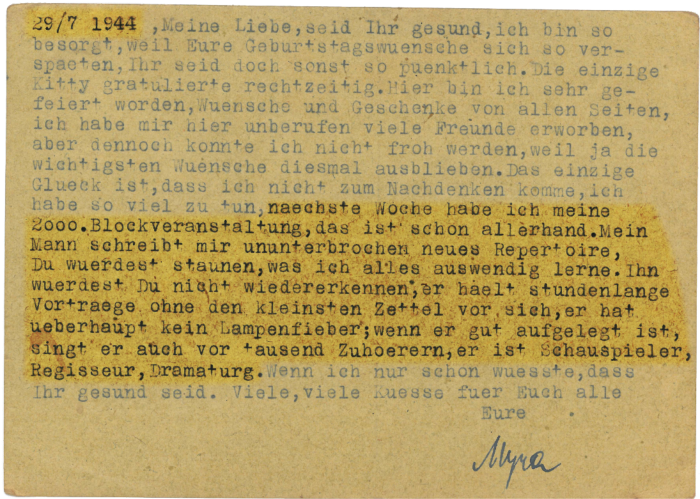Sources
Eckstein, P., 1999. Pavel Haas. In Initiative Hans Krása, ed. Komponisten in Theresienstadt. Hamburg: Initiative Hans Krása, pp. 9-19.
Migdal, U. ed., Und die Musik spielt dazu! Chansons und Satiren aus dem KZ Theresienstadt, Munich: *.

Leo Strauss, hijo del compositor vienés de opereta Oskar Strauss, también fue un talentoso libretista y músico. Sin embargo, su muerte prematura en Auschwitz hizo que sus logros musicales fueran restringidos a los campos nazis pero que se recordaran después de la guerra. Nació en 1897 y se sabe poco de su vida antes de su detención y posterior encarcelamiento en Theresienstadt. Sin lugar a dudas recibió una amplia formación musical, probablemente de su padre, y trabajó como libretista y escritor de cabaret.
Arrestado junto con su esposa Myra, Strauss fue primero enviado al “campo de espectáculos” de Theresienstadt, donde los nazis encerraron a una cantidad de músicos y artistas judíos conocidos. En Theresienstadt, Strauss participó de los programas de la Freizeitgestaltung (división para la recreación), especialmente en las producciones de cabaret, como libretista y como artista. Se hizo conocido por canciones que reflejaban la crudeza de la vida en el campo y que al mismo tiempo intentaban aliviarla. Como la mayoría de los escritores de cabaret, recurría al humor, al cinismo y a la ironía para criticar su entorno. Quizás su contribución más duradera a la escena cultural de Theresienstadt fue la canción en francés Als-ob (Como si), cuya melodía fue compuesta por Willy Schwartz. La letra de la canción condenaba a aquellos que vivían en un mundo de ilusiones y de autoengaño:
"Conozco una ciudad pequeña
una ciudad muy linda,
No la llamo por su nombre
La llamo 'como si'.
Allí hay un café
Como el Café Europeo
y con la música que tocan
uno se siente como si...
allí la gente carga con un destino pesado
como si no fuera tan pesado
y habla de un futuro mejor
como si hubiera un mañana".
A pesar de esta letra crítica, la canción se convirtió en un éxito, especialmente cuando fue interpretada por la banda de jazz Ghetto Swingers.
En octubre de 1944, Strauss y su esposa fueron deportados a Auschwitz, donde fueron asesinados.
Eckstein, P., 1999. Pavel Haas. In Initiative Hans Krása, ed. Komponisten in Theresienstadt. Hamburg: Initiative Hans Krása, pp. 9-19.
Migdal, U. ed., Und die Musik spielt dazu! Chansons und Satiren aus dem KZ Theresienstadt, Munich: *.
Despite these critical lyrics, the song became a hit, particularly as performed by the jazz band the Ghetto Swingers.
In October 1944, Strauss and his wife were deported to Auschwitz, where they were both killed.
Myra corresponded with relatives while interned in Theresienstadt. She wrote:
'Next week I have my 2,000th “block event” – that’s quite something! My husband continually writes new Repertoire for me. You’d be amazed at what I learn by heart. You wouldn’t recognise him – he gives performances for hours on end without the slightest prompt – he never gets stage fright. When he’s really in the mood, he’ll sing in front of an audience of a thousand. He’s an actor, producer, literary manager.'

Postcard from Myra Strauss in Theresienstadt to Margot Goergey in Vienna dated 29 July 1944 and postmarked 19 August 1944. Courtesy of Joy and David Dunn.
Eckstein, P., 1999. Pavel Haas. In Initiative Hans Krása, ed. Komponisten in Theresienstadt. Hamburg: Initiative Hans Krása, pp. 9-19.
Migdal, U. ed., Und die Musik spielt dazu! Chansons und Satiren aus dem KZ Theresienstadt, Munich: *.